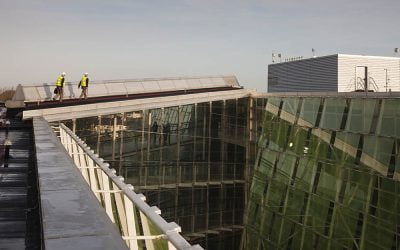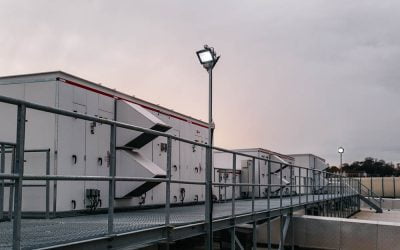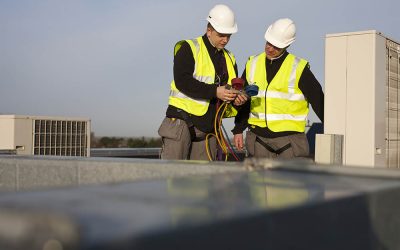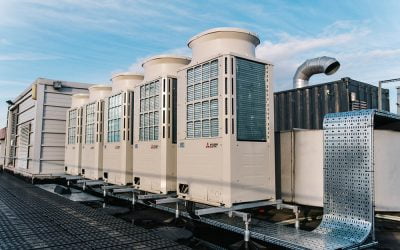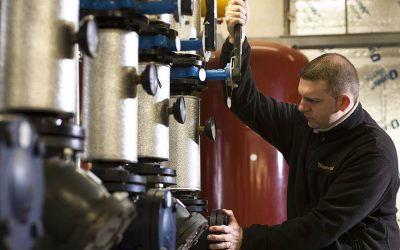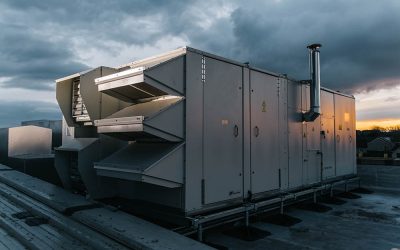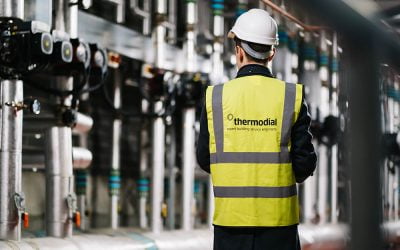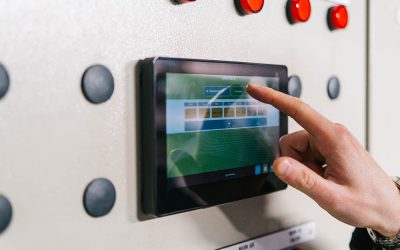About the role – service engineer Andy

It opens doors you never knew existed
Andy Reynolds joined in 2016, having completed his apprentice in 2010 and worked for various electrical contractors as an electrician.
Andy talks about his role, experience and the Thermodial work environment. He also offers advice for anyone thinking of joining Thermodial and recognises the opportunities that can come about.
Every day as a service engineer is different
Each day as a Thermodial service engineer is very different. Some days I am on maintenance, other days I am on repairs and sometimes I am on callouts.
On maintenance, there is a weekly schedule issued in advance, so five days before, you know where you’ll be for each day of the following week. Generally I pick up an apprentice, if one has been assigned to me, and I arrive at the pre-arranged site to start for 8am. Starting early means you can finish a bit earlier and beat the traffic on the way home. The weekly schedule is good because you can plan out your week in advance.
The majority of repair work is pre-arranged, but callouts are different. You won’t be responsible for callouts until you are capable and appropriately trained as a registered gas installer (RGI), F-Gas registered (FGR) and are capable of minor plumbing and electrical works.
Callouts - technology can help
On a callout, the idea is to get to site as soon as possible and diagnose the issue. Then to get approval to carry out remedial works or to prepare a quotation to fix the issue, if necessary.
Everything you need for these different jobs is at your fingers tips. The service engineer can log into Thermodial’s computerised maintenance management system (CMMS) through thermodial.ie, view the previous site history and get up to speed on recent site activities. On some of the sites, I can log on to and access equipment remotely through the building energy management system (BEMS) and get an idea of what’s happening before arriving to a callout. You try to gather as much information as possible to help make a decision.
Once works are complete and systems are back up and running efficiently, I get great job satisfaction from seeing that. I have always enjoyed problem solving.
I joined as an electrician
When I joined Thermodial, I joined as an electrician. I didn’t know anything about heating systems or air handling units. Over the last five years I have expanded my skillset, way beyond what I knew coming in. Now I can handle callouts and deal with all types of HVAC equipment.
My role service engineer role – a vital link
The maintenance contractor and the service engineer are the vital link in the running of any business with a building. A supermarket deli cannot function without hot water. If there was an interruption to heating in the tropical greenhouses we provide maintenance to, precious flowers and plants would die.
The service engineers are the front line and the face of the company. They can also contribute to the growth of the company, not only through keeping customers satisfied, but seeking out new customers too. We got a call recently to look at a school’s heating system. I performed a callout after it was diagnosed as a BEMS issue, I attended site and got the heating system up and running. I then advised the school that they should have some kind of maintenance regime in place on all of the HVAC equipment to reduce the risk of failure. They have since come on-board as a customer.
Colleagues crucial
My colleagues are the most important support in my role. If I have an issue, someone is just a phone call away. I have never been stuck. I ring colleagues based on their experience, because there are different skillsets throughout the company. Although the longer I’ve been here, the less I’ve needed to ring for help.
The role of the service engineer
The service engineer’s job in performing planned preventative maintenance (PPM) is trying to reduce any potential downtime of the important HVAC equipment. This is done by spotting upcoming faults and removing points of failure, like a pump running over current or a three port value sticking. It is also done by servicing boilers making sure they reach efficiency targets.
In preparing for PPM visits, the service engineer travels from their house in their company van. Depending on the site, the service engineer should ring ahead and tell the customer when they are coming, especially if it is first thing in the morning. The customer appreciates that courtesy. You should have all of the correct tools in your van – Thermodial provide all of those. Also, collect any replacement equipment from the office if you are carrying out repair work before travelling to site.
Once you get up and running as a HVAC service engineer and you are trusted on key sites, you can essentially work for yourself – inputting into the make-up of the weekly schedule before it is released.
Any pressure I am under as a service engineer is self-pressure – to get things done right. It can bring out the best in you.
Training and benefits
It takes two years after joining Thermodial before you are comfortable with all systems. The great thing is, I have never felt alone when working on my own. There is always support there.
I am with Thermodial for more than five years now and any training I have asked for has been considered and where necessary, provided. Currently I am training in BEMS and controls after Thermodial wanted to expand in this area and a door opened up for me.
There are plenty of other benefits to the job too. There’s a bonus, vehicle, phone, tools, Snickers uniform and health insurance, to name but a few. When I worked on building sites, I had to provide my own transport; tax and insure my car, get a toll tag and pay for parking and fuel. Now all of that hassle has been taken away.
Aside from those benefits, I get a huge amount of job satisfaction from the service engineer role. Arriving at site, sourcing and repairing a problem for the customer is very rewarding to me. It’s also nice when you get recognition at staff meetings, where customer feedback is shared – it is great to be recognised for your work.
Positive work environment
Thermodial provides an excellent and very positive work environment. When I was working in construction, it was all shouting and roaring to get things done quickly. There’s a slower pace here, as there is more thinking and problem solving involved in what you are doing. Things are done right instead of quickly. It took a while to adjust, but I wouldn’t go back to the way things were in construction.
Also at Thermodial, there is an open door policy. You have a direct line – and you feel comfortable picking up that direct line – to the company directors. If needs be, they’ll meet you on site to solve an issue. I’ve found in other places, they say they have an open door policy, but in reality, they don’t.
Service engineer skills
I have learnt a few skills during my time at Thermodial. One of the main ones is to have patience. Take a step back and read the situation. I’ve also developed people skills, as relationships are a big part of the job.
I’d also like to think that I am trustworthy – I am the link from the company to the customer. 50% of the job is about developing a trustworthy relationship with the customer because that relationship makes it easier for both parties to work together.
Advice for service engineers starting
The advice I would offer to someone starting as a new service engineer with Thermodial would be to calm down. Watch and learn. Take a step back and assess. Shake the fear of failure. Have confidence in your own abilities – I wish I had told myself that five years ago.
You won’t regret it, as it opens up doors to places that you never knew existed – like going from being an electrician to BEMS and controls via HVAC. Thermodial won’t put you in a position that you can’t handle. You are never allocated jobs that are beyond your skillset.
On occasions where you can’t fix a problem, pick up the phone. I found the lads very helpful when I joined; now I am the one helping the new service engineers and apprentices. It gives great job satisfaction seeing an apprentice’s abilities develop under your guidance.
Are you interested in joining the Thermodial team and becoming a service engineer or apprentice?
Apply to join Thermodial – use the form on this page to unload your CV and apply online today.
About the role - Thermodial provide the time, tools and training to triumph
Will talks about joining as an apprentice and what it has taken to become a multi-skilled service engineer with Thermodial.
Apply online for HVAC careers…
Talk To Thermodial
When Thermodial were founded in 1986, the founders had a vision of an engineering focused service, but also one that was responsive and reliable.
This belief should hold true to dealing with questions or information requests, such as one you may have.
Please contact us by filling in the form below, for a prompt response; email info@thermodial.ie or ring us in Dublin.
As the experts in HVAC maintenance, upgrades and energy management, we would be happy to respond to your requests.


